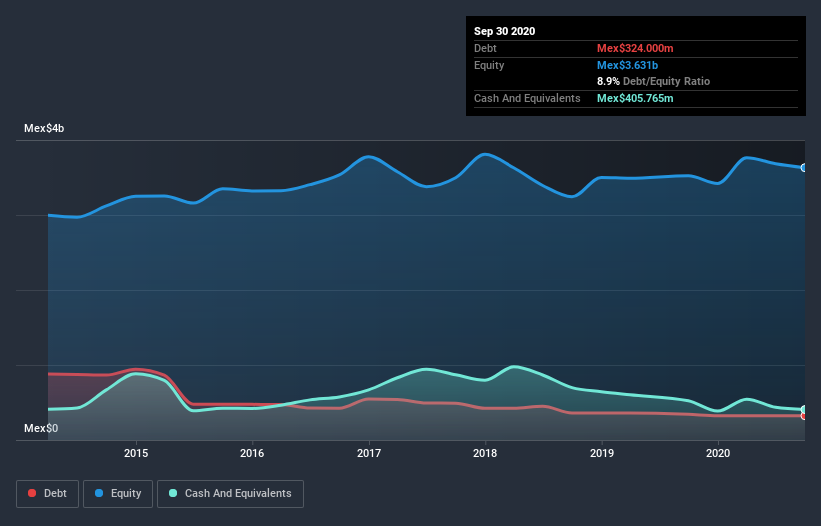Legendary fund manager Li Lu (who Charlie Munger backed) once said, 'The biggest investment risk is not the volatility of prices, but whether you will suffer a permanent loss of capital.' It's only natural to consider a company's balance sheet when you examine how risky it is, since debt is often involved when a business collapses. Importantly, DINE, S.A.B. de C.V. (BMV:DINEB) does carry debt. But should shareholders be worried about its use of debt?
When Is Debt A Problem?
Generally speaking, debt only becomes a real problem when a company can't easily pay it off, either by raising capital or with its own cash flow. Ultimately, if the company can't fulfill its legal obligations to repay debt, shareholders could walk away with nothing. While that is not too common, we often do see indebted companies permanently diluting shareholders because lenders force them to raise capital at a distressed price. By replacing dilution, though, debt can be an extremely good tool for businesses that need capital to invest in growth at high rates of return. When we examine debt levels, we first consider both cash and debt levels, together.
View our latest analysis for DINE. de
What Is DINE. de's Net Debt?
As you can see below, DINE. de had Mex$324.0m of debt at September 2020, down from Mex$342.0m a year prior. But it also has Mex$405.8m in cash to offset that, meaning it has Mex$81.8m net cash.

A Look At DINE. de's Liabilities
Zooming in on the latest balance sheet data, we can see that DINE. de had liabilities of Mex$796.4m due within 12 months and liabilities of Mex$1.47b due beyond that. Offsetting this, it had Mex$405.8m in cash and Mex$155.4m in receivables that were due within 12 months. So it has liabilities totalling Mex$1.71b more than its cash and near-term receivables, combined.
Since publicly traded DINE. de shares are worth a total of Mex$9.23b, it seems unlikely that this level of liabilities would be a major threat. But there are sufficient liabilities that we would certainly recommend shareholders continue to monitor the balance sheet, going forward. While it does have liabilities worth noting, DINE. de also has more cash than debt, so we're pretty confident it can manage its debt safely. The balance sheet is clearly the area to focus on when you are analysing debt. But it is DINE. de's earnings that will influence how the balance sheet holds up in the future. So when considering debt, it's definitely worth looking at the earnings trend. Click here for an interactive snapshot.
Over 12 months, DINE. de made a loss at the EBIT level, and saw its revenue drop to Mex$623m, which is a fall of 77%. To be frank that doesn't bode well.
So How Risky Is DINE. de?
Although DINE. de had an earnings before interest and tax (EBIT) loss over the last twelve months, it generated positive free cash flow of Mex$82m. So although it is loss-making, it doesn't seem to have too much near-term balance sheet risk, keeping in mind the net cash. With revenue growth uninspiring, we'd really need to see some positive EBIT before mustering much enthusiasm for this business. The balance sheet is clearly the area to focus on when you are analysing debt. However, not all investment risk resides within the balance sheet - far from it. For example, we've discovered 1 warning sign for DINE. de that you should be aware of before investing here.
If you're interested in investing in businesses that can grow profits without the burden of debt, then check out this free list of growing businesses that have net cash on the balance sheet.
If you’re looking to trade DINE. de, open an account with the lowest-cost* platform trusted by professionals, Interactive Brokers. Their clients from over 200 countries and territories trade stocks, options, futures, forex, bonds and funds worldwide from a single integrated account. Promoted
New: Manage All Your Stock Portfolios in One Place
We've created the ultimate portfolio companion for stock investors, and it's free.
• Connect an unlimited number of Portfolios and see your total in one currency
• Be alerted to new Warning Signs or Risks via email or mobile
• Track the Fair Value of your stocks
This article by Simply Wall St is general in nature. It does not constitute a recommendation to buy or sell any stock, and does not take account of your objectives, or your financial situation. We aim to bring you long-term focused analysis driven by fundamental data. Note that our analysis may not factor in the latest price-sensitive company announcements or qualitative material. Simply Wall St has no position in any stocks mentioned.
*Interactive Brokers Rated Lowest Cost Broker by StockBrokers.com Annual Online Review 2020
Have feedback on this article? Concerned about the content? Get in touch with us directly. Alternatively, email editorial-team (at) simplywallst.com.
About BMV:DINE B
DINE. de
Through its subsidiaries, develops real estate projects in Mexico.
Acceptable track record with mediocre balance sheet.
Market Insights
Community Narratives



